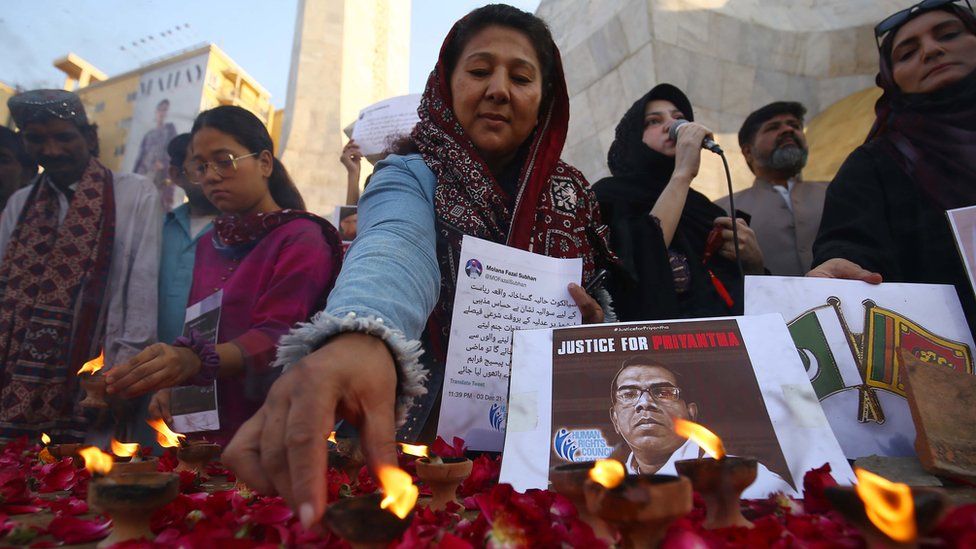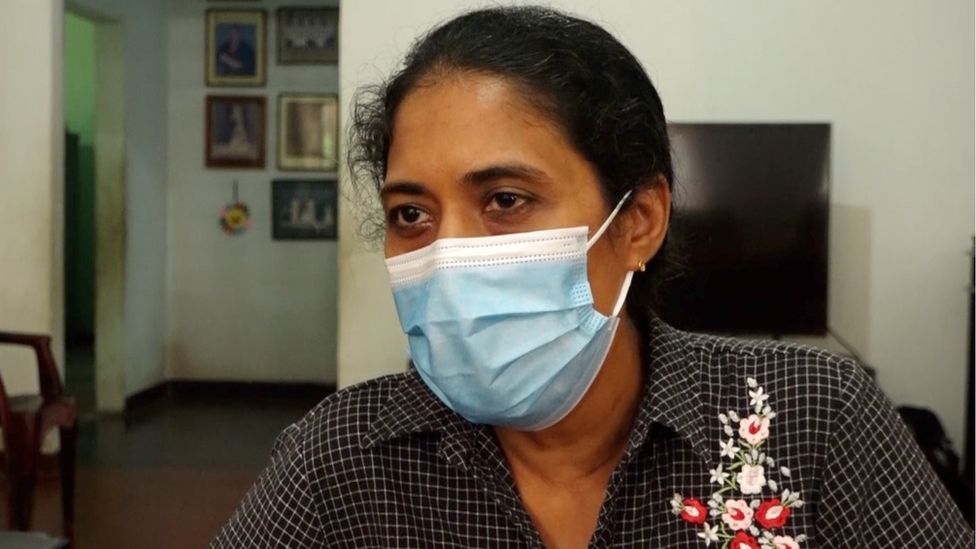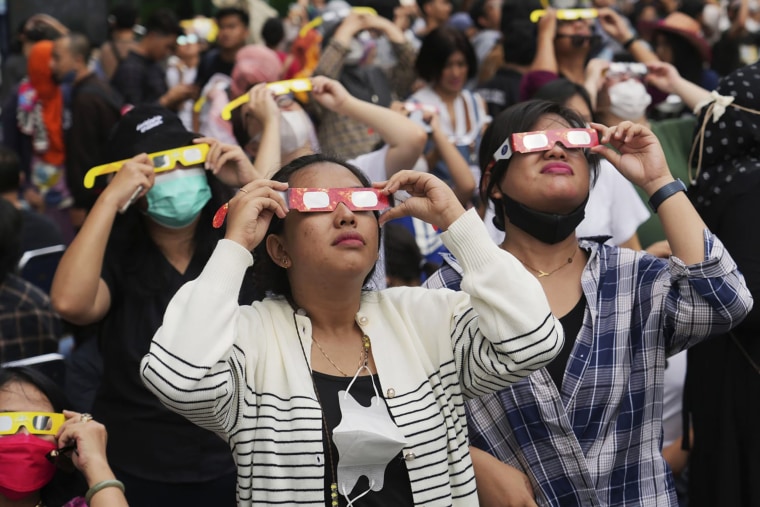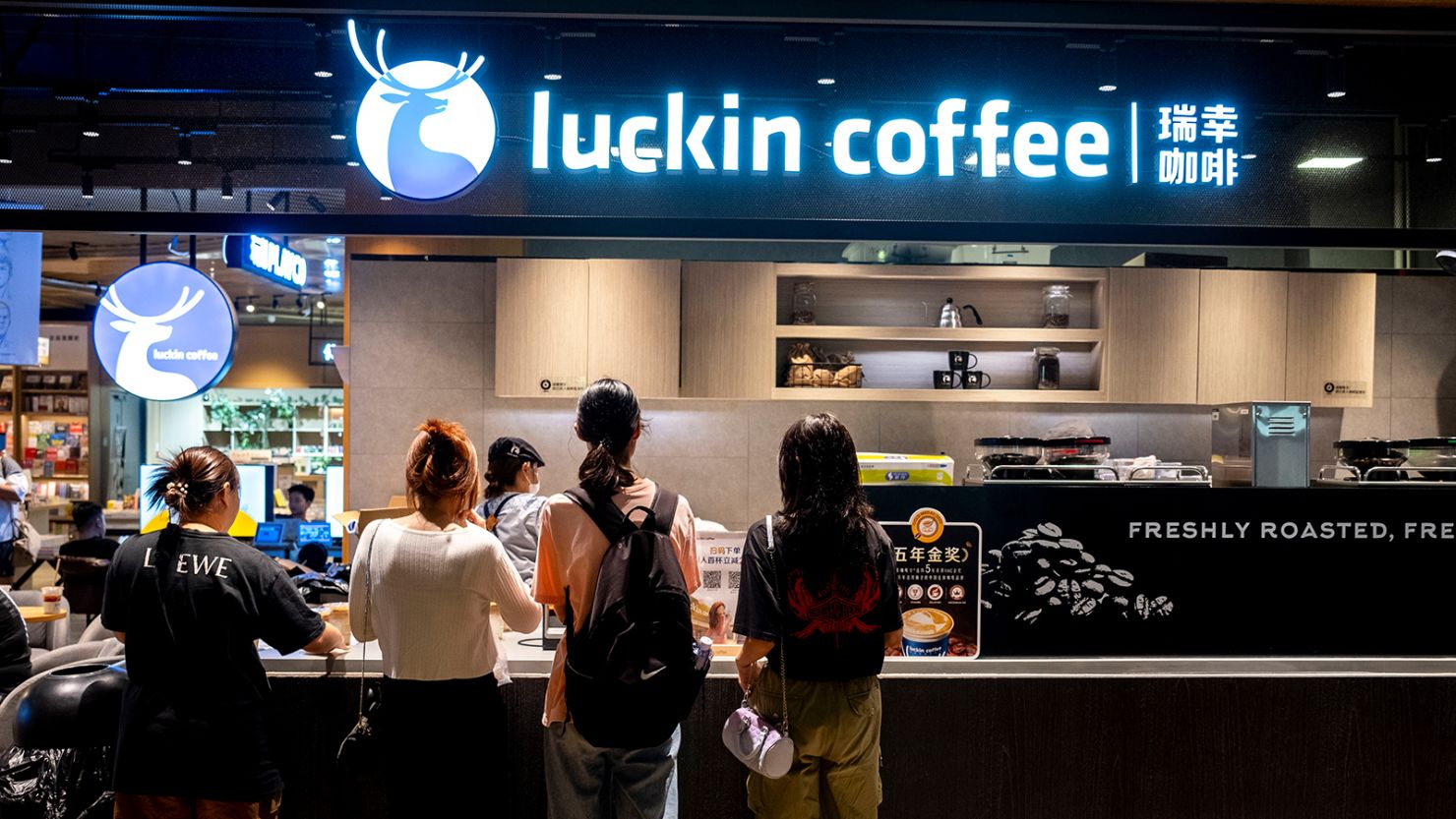Pakistan woman in Arabic script dress saved from mob claiming blasphemy
 IMAGE SOURCE,
IMAGE SOURCE,
SHALIK RIYADH/INSTAGRAM
Image caption,
The dress has the word "Halwa" printed in Arabic letters on it, meaning beautiful in Arabic
By Caroline Davies
Pakistan correspondent
An angry mob in Pakistan accused a woman who wore a dress adorned with Arabic calligraphy of blasphemy, after mistaking them for Quran verses.
She was saved by police who escorted her to safety after hundreds gathered. She later gave a public apology.
The dress has the word "Halwa" printed in Arabic letters on it, meaning beautiful in Arabic.
Blasphemy is punishable by death in Pakistan. Some people have been lynched even before their cases go on trial.
Police told the BBC they first received a call at about 13:10 local (08:10 GMT) on Sunday that a crowd had gathered around a woman at a restaurant in Lahore, the capital of the Pakistani province of Punjab.
Around 300 people had crowded outside the restaurant by the time they arrived, said Assistant Superintendent Syeda Shehrbano.
Videos of the scene circulated on social media, with one showing a woman, visibly scared, sitting in the far corner of the restaurant, shielding her face with her hand.
In another, she is surrounded by officers, who had formed the only barrier between her and a growing crowd who were shouting for her to remove the shirt. In some videos, people can be heard chanting that those who blaspheme must be beheaded.
Footage shared on social media shows Ms Shehrbano standing at the restaurant's entrance, trying to restore order to an increasingly charged crowd.
"Nobody actually knew what was written on the shirt," she said. "The major feat was to try to get that woman out of the area in order to ensure that she is safe."
Ms Shehrbano adds that she had to "negotiate" with the crowd.
"We told them we would take the woman with us, her actions are going to be taken into account and we're going to hold her responsible for whatever crime committed as per the law of the land."
The footage later showed Ms Shehrbano putting her arm around the woman, now covered by a black robe and a headscarf, and pushing through the crowd. Other police officers formed a chain with their arms to clear their path as people in the crowd pushed against them.
Ms Shehrbano said supporters of the hardline Tehreek-e-Labaik Pakistan (TLP) party were among those in the crowd.
The woman was brought into a police station, where several religious scholars confirmed that the text on her dress was Arabic calligraphy, not verses from the Quran.
The police then asked the scholars to record a video stating their findings and that the woman was innocent.
"I didn't have any such intention, it happened by mistake. Still I apologise for all that happened, and I'll make sure it never happens again," she said, adding that she is a devout Muslim and would never commit blasphemy.
Authorities said she was in Lahore to do some shopping, and has since left the city.
Tahir Mahmood Ashrafi, a former adviser to the prime minister on religious affairs said on X, formerly known as Twitter, that the men in the crowd, rather than the woman, should have been the ones to apologise.
Ms Shehrbano said authorities have seen a "mushrooming of incidents" similar to that on Sunday.
"Had I not screamed and had I not convinced the crowd that we will do something about it, It would have turned nastier… Thank God," she said. She has been widely praised, with the Chief of Punjab police calling for her to receive an award for her bravery.
Laws against blasphemy were first codified by India's British rulers and expanded in the 1980s under the military government.
In August last year, scores of churches and homes were burnt in Jaranwala, a city east of Pakistan, after two men from the city were accused of damaging the Quran.
Additional reporting by BBC Urdu
Pakistan: Killing of Sri Lankan accused of blasphemy sparks protests
 IMAGE SOURCE,
IMAGE SOURCE,
EPA
Image caption,
Priyantha Diyawadanage's violent death has sparked protests across Pakistan and Sri Lanka
A brutal mob killing of a Sri Lankan man accused of blasphemy in Pakistan has sparked protests in both countries, with Pakistan's leader condemning the vigilante violence.
Priyantha Diyawadanage, 48, a factory manager in the city of Sialkot, was beaten to death on Friday and his body set alight.
More than 100 people have been arrested so far, said Pakistan PM Imran Khan.
He has described the incident as a "day of shame" for his country.
The victim's family in Sri Lanka have told the BBC they are in despair.
His wife, Nilushi Dissanayaka, called on both Pakistan and Sri Lanka's governments to conduct a full investigation to "bring justice to my husband and my two children".
"I saw that he was being attacked on the internet... it was so inhumane," she said. Image caption,
Image caption,
Nilushi Dissanayaka is distraught over her husband's killing
Videos of the lynching proliferated across social media over the weekend, and showed scenes of the incensed crowd dragging Mr Diyawadanage from his workplace and beating him to death.
They then burnt his body, and several people in the crowd were seen taking selfies with his corpse.
What led to the mob violence?
The violence had begun after rumours spread that Mr Diyawadanage had allegedly committed a blasphemous action, in tearing down posters with the name of the Prophet Muhammad, local police chiefs said.
But a colleague, who rushed to the site in a bid to save him, told the Associated Press of Pakistan that Mr Diyawadanage had only removed the posters as the building was about to be cleaned.
His wife has also denied the blasphemy claim.
"I totally reject reports that said my husband tore down posters in the factory. He was an innocent man," she told the BBC.
"He was very much aware of the living conditions in Pakistan. It is a Muslim country. He knew what he should not do there and that's how he managed to work there for eleven years."
The scale of the vicious killing on Friday - involving hundreds of people - has shocked the nation and sparked vigils.
Prime Minister Imran Khan condemned the "horrific vigilante attack" and vowed that "all those responsible will be punished with the full severity of the law".
Blasphemy is defined as speaking insultingly about a particular religion or god. In Pakistan, it can carry a potential death sentence for anyone who insults Islam.
The country's blasphemy law prohibits disturbing a religious assembly, trespassing on burial grounds, insulting religious beliefs or intentionally destroying or defiling a place or an object of worship.
Making derogatory remarks against Islamic personages is an offence - and in 1982, a clause prescribing life imprisonment for "wilful" desecration of the Koran, the Muslim holy book, was added.
In 1986, a separate clause was inserted to punish blasphemy against the Prophet Muhammad and the penalty recommended was "death, or imprisonment for life".
In Pakistan, even unfounded accusations can incite protests and mob violence against alleged perpetrators. Human rights critics have long argued that minorities are often the target of accusations.
Skip twitter post by Imran Khan
Allow Twitter content?
This article contains content provided by Twitter. We ask for your permission before anything is loaded, as they may be using cookies and other technologies. You may want to read Twitter’s cookie policy
, external
and privacy policy
, external
before accepting. To view this content choose ‘accept and continue’.
Accept and continue
The BBC is not responsible for the content of external sites.
End of twitter post by Imran Khan He said he had also spoken with Sri Lankan president Gotabaya Rajapaksa "to convey our nation's anger and shame to the people of Sri Lanka."
He said he had also spoken with Sri Lankan president Gotabaya Rajapaksa "to convey our nation's anger and shame to the people of Sri Lanka."
Sri Lankan authorities have yet to comment fully on the case, fearing potential unrest and retribution against Muslim communities locally.
Mr Diyawadanage's body is due to be returned to Sri Lanka on Monday, and some expect protests to be held in the capital Colombo.
Everything you need to know about this year's solar eclipse
The eclipse on April 8 will cut across much of the U.S. NASA estimates that 31.6 million people live within the roughly 100-mile-wide path of totality this year.
By Denise Chow
A total solar eclipse will cross North America in April, offering millions of sky-watchers a rare opportunity to see afternoon skies temporarily darken and a “ring of fire” become illuminated overhead.
The eclipse on April 8 promises to be a major event because its path fortuitously cuts across Mexico, the continental U.S. and a small part of eastern Canada. In the U.S., weather permitting, sky-watchers in 15 states will have the chance to see the moon almost completely cover the sun, casting its shadow over the fiery orb and creating the effect of a blazing ring in the sky. People wear protective glasses to watch a solar eclipse in Jakarta, Indonesia, on April 20, 2023.Tatan Syuflana / AP file
People wear protective glasses to watch a solar eclipse in Jakarta, Indonesia, on April 20, 2023.Tatan Syuflana / AP file
In all other states in the continental U.S., viewers will be treated to a partial solar eclipse, with the moon appearing to take a “bite” out of the sun and obscuring only part of it in the sky.
Recommended
CLIMATE IN CRISIS
Climate change is throwing the water cycle into chaos across the U.S.
Here's everything you need to know about the coming total solar eclipse.
How to safely view a solar eclipse
People should never gaze directly at the sun during a solar eclipse, even when it is partly or mostly covered by the moon. Special eclipse glasses or pinhole projectors are required to safely view solar eclipses and prevent eye damage.
Sky-watchers should never view any part of the sun through binoculars, telescopes or camera lenses without specific solar filters attached to them. Eclipse glasses should not be used with them. Failing to take the proper precautions will result in severe eye injury, according to NASA.
During the few minutes of totality, when the moon is fully blocking the sun, it is safe to look at the total solar eclipse with the naked eye, but eclipse glasses should be used at all other times to look at the sun.
What is a solar eclipse?
Solar eclipses are essentially cosmic confluences, occurring when the sun, the moon and Earth align. The moon passes in front of the sun, temporarily blocking its light.
The moon can fully obscure the sun, as is the case with total solar eclipses, or it can block only a part of the sun’s light, as happens with partial solar eclipses. NASA's Goddard Space Flight Center
NASA's Goddard Space Flight Center
Who will be able to see it?
The eclipse is rare because it will follow a slightly wider path over more populated areas of the continental U.S. compared to other total solar eclipses in recent memory.
NASA estimates that 31.6 million people live within the roughly 100-mile-wide path of totality this year and that an additional 150 million people live within 200 miles of the path.
After it crosses Mexico, the eclipse’s path will travel through Texas, Oklahoma, Arkansas, Missouri, Illinois, Kentucky, Indiana, Ohio, Pennsylvania, New York, Vermont, New Hampshire and Maine. Tiny parts of Michigan and Tennessee will also be able to witness totality if conditions are clear.
After it makes its way through the U.S., the eclipse will cross into Canada, passing over southern Ontario, Quebec, New Brunswick, Prince Edward Island and Cape Breton, at the eastern end of Nova Scotia.
The most spectacular views will require being within the path of totality, but people coast to coast still have the opportunity to take part in the astronomical event. A partial solar eclipse will be visible throughout all 48 states of the contiguous U.S., and NASA (along with several other organizations) plans to stream live views of the total solar eclipse online.
When will it happen?
The timing, including the length of totality, will vary depending on location, but some spots will experience darkness and the ring of fire for up to 4 minutes and 28 seconds.
Below is a list of timings for some populated cities along the path of totality, as provided by NASA, but there are a number of other resources online, including at NationalEclipse.com and TimeandDate.com, to help people plan where to be and what to expect on the day.
Dallas: Partial eclipse begins at 12:23 p.m. CT; totality begins at 1:40 p.m. CT; totality ends at 1:44 p.m. CT; partial eclipse ends at 3:02 p.m. CT.
Little Rock, Arkansas: Partial eclipse begins at 12:33 p.m. CT; totality begins at 1:51 p.m. CT; totality ends at 1:54 p.m. CT; partial eclipse ends at 3:11 p.m. CT.
Cleveland: Partial eclipse begins at 1:59 p.m. ET; totality begins at 3:13 p.m. ET; totality ends at 3:17 p.m. ET; partial eclipse ends at 4:29 p.m. ET.
Buffalo, New York: Partial eclipse begins at 2:04 p.m. ET; totality begins at 3:18 p.m. ET; totality ends at 3:22 p.m. ET; partial eclipse ends at 4:32 p.m. ET.
Lancaster, New Hampshire: Partial eclipse begins at 2:16 p.m. ET; totality begins at 3:27 p.m. ET; totality ends at 3:30 p.m. ET; partial eclipse ends at 4:38 p.m. ET.
In China’s battle of the lattes, Luckin Coffee keeps beating Starbucks
 Customers at a Luckin Coffee outlet in Tianjin, China on July 24, 2023 Zhang Peng/LightRocket/Getty Images
Customers at a Luckin Coffee outlet in Tianjin, China on July 24, 2023 Zhang Peng/LightRocket/Getty Images
Editor’s Note: Sign up for CNN’s Meanwhile in China newsletter, which explores what you need to know about the country’s rise and how it impacts the world.
Hong KongCNN —
Luckin Coffee, the Chinese chain that has been rebuilding its business since a fraud scandal four years ago, has reported a commanding sales lead over rival Starbucks in the important China market.
In 2023, Luckin generated total net revenue of 24.9 billion yuan ($3.5 billion), up 87% from a year earlier, according to its financial results released on Friday.
It didn’t break down its revenue by geography, but the vast majority of its sales come from China. Internationally, it has only 30 outlets in Singapore, the first of which debuted last March.
Starbucks (SBUX), in comparison, reported total revenue of $3.05 billion in China for fiscal 2023 that ended October 1, according to a CNN calculation based on the company’s quarterly results. The US coffee chain has not reported a full-year figure for China sales.
Xiamen-based Luckin said its unaudited net income for 2023 reached 2.85 billion yuan ($396 million), compared to 488 million yuan ($68 million) in 2022, it said.
Luckin, which already calls itself China’s biggest coffee chain, says it had surpassed Starbucks in mainland China by number of outlets in 2019.
The surge in Luckin’s sales last year was partly driven by its rapid expansion. By the end of 2023, Luckin had 16,218 stores in China, nearly double its 2022 count of more than 8,200.
Starbucks, by contrast, had 6,975 stores in China as of the end of January, according to the company’s latest quarterly result published earlier this year. That number was up 14.5% from a year earlier.
Some of Luckin’s stores are self-operated, while others are run by partners. Starbucks’ outlets in China are entirely company-owned.
Globally, Starbucks is still by far the largest coffee chain, with 38,586 stores worldwide. The United States and China are its two largest markets.
China, once a tea-drinking nation, has become a global coffee industry powerhouse, despite grappling with numerous economic problems in recent years. Data from the International Coffee Organization last year showed that coffee consumption in the country grew 15% in the year ended in September.
Much of this demand is driven by the younger generation. As many as 36% of coffee consumers in the country were between 25 and 34 years old, and 30% were between 35 and 44 years old, according to a 2021 survey by Daxue Consulting, a Chinese market research firm.
The number of branded coffee shops in China jumped 58% in the past twelve months, reaching 49,691 outlets, according to a December report by World Coffee Portal. That helped China overtake the US as the world’s largest branded coffee shop market.
Luckin acknowledged the fierce competition.
“We remain focused on our pricing and expansion strategy to sustain our growth and market share,” said Jinyi Guo, chairman and chief executive officer of Luckin Coffee, in a statement that accompanied the company’s results. People visiting a Starbucks booth at an exhibition in Beijing on November 28, 2023 VCG/Visual China Group/Getty Images
People visiting a Starbucks booth at an exhibition in Beijing on November 28, 2023 VCG/Visual China Group/Getty Images
Luckin was founded in 2017 and is backed by Chinese private equity firm Centurium Capital. It focuses on catering to young people, with mostly takeout booths and cashless payments. Its beverages are about 30% cheaper than those offered by Starbucks.
Its bare bones stores usually offer only the most basic services, which has allowed the company to expand rapidly at a lower cost. It also requires consumers to use mobile phones to place orders, enabling them to collect extensive costumer data.
Making a comeback
By 2019, the company had outnumbered Starbucks stores in China, with more than 4,500 outlets, according to the company.
In 2019, Luckin went public in New York, where it was welcomed by investors who believed it could be a serious challenger to Starbucks.
But the company was forced to retreat a year later following the admission that its earnings had been fabricated. Luckin was ultimately delisted from the Nasdaq, and its then chairman and CEO were both fired. It was also slapped with a $180 million fine by the US Securities and Exchange Commission.
After that, the company pledged to rebuild its businesses. Centurium Capital, an early investor in the coffee chain, became its controlling shareholder.
Despite being surpassed in both store count and now sales, Starbucks still maintains a wide lead over Luckin when it comes to profitability. The Chinese company’s profitability has suffered as a result of its rapid expansion.
In response to the competition, Starbucks announced partnerships with Alibaba (BABA) and Meituan in 2018 and 2022, respectively, expanding its online reach to Chinese consumers.
While Luckin created buzz last year with a collaboration with Chinese liquor brand Kweichow Moutai, Starbucks is also attracting eyeballs with its innovative new drinks.
The American giant launched a pork-flavored coffee earlier this month, in an attempt to cater to local tastes and traditions. Priced at $9.45, the drink combines Dongpo Braised Pork Flavor Sauce with espresso and steamed milk, with extra pork sauce and pork breast meat for garnish.
Hassan Tayir contributed reporting.
Correction: An earlier version of this story incorrectly stated Luckin’s net income in 2023 and 2022.




























